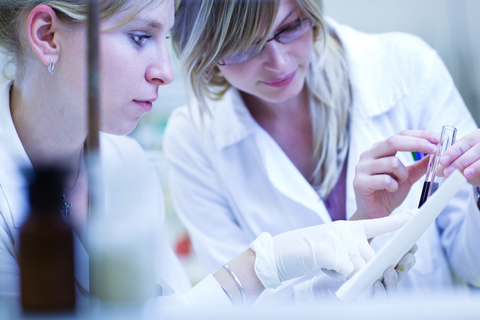Welsh researchers have made a major breakthrough in diagnosing bowel cancer

A simple blood test developed by Welsh experts could lead to bowel cancer patients being diagnosed much earlier and significantly improve their chances of survival (WalesOnline, 2016). Initial signs are so promising the test could become used throughout the NHS within the next few years, with a clinical trial starting in GP practices across Abertawe Bro Morgannwg University Health Board (ABMU) in 2017.
The research has been carried out by ABMU’s Department of Colorectal Surgery in partnership with Swansea University ’s Centre for NanoHealth and Department of Physics.
Colorectal, or bowel, cancer is the third most common cancer worldwide, with 41,000 cases diagnosed in the UK every year. Early diagnosis is hampered by the lack of “red-flag” symptoms and patients often present either at a late stage of development or as an emergency, reducing their chances of survival.
The project looks at how nanotechnology can be used to screen patients, with a blood test reducing the need for current tests, such as colonoscopy, which are more intrusive. It uses Raman spectroscopy to create a “fingerprint” specific to bowel cancer. The initial study involved one hundred and sixty patients from the Swansea area, some of them known to have bowel cancer and some known not to have it. It was funded by a grant from Cancer Research Wales.
The project leaders are Professor Dean Harris, Singleton Hospital consultant colorectal surgeon and honorary professor at Swansea University Medical School, and Professor Peter Dunstan of Swansea University’s School of Physics.
Professor Harris said “We are delighted by the accuracy of the blood test to date. At 97% it exceeds that of other testing methods, even colonoscopy. The next stage is what is known as the validation phase, which is when we test it on blood without knowing whether the patient does or doesn’t have bowel cancer. So far we have tested 30-40 samples. However, we need to do bigger numbers so we have applied for a £250,000 grant that would allow us to expand the validation phase. I think within two years we will know with more certainty the exact accuracy of the blood test based on much bigger patient numbers.”
He said GPs could, in future, be able to offer the blood test to patients, providing a simple but effective screening tool. He said “The GPs we have engaged with so far are very excited about the prospect. We’re hoping that within three to five years this could be offered as a mainstream NHS test. There’s such a global need for something like this and we have taken the technology on much further than we anticipated. We are now ready to talk to manufacturing companies to make analysing the blood tests much easier.”
The project has already won the Research Excellence in the NHS Award at the MediWales Innovation Awards ceremony held in the National Museum of Wales. Professor Harris said “The award is huge recognition for the Department of Colorectal Surgery. We’re one of the busiest surgical units in Wales and have always been a research-active department. We have expanded our research programme in recent years with new collaborators, and are delighted the award recognises this.”
The research team also included Professor Cathy Thornton and Professor Paul Lewis of Swansea University’s School of Medicine, PhD student Cerys Jenkins, and Katie Welsby, a post-doctorate research assistant.








